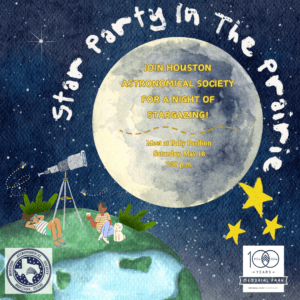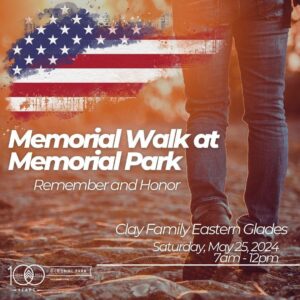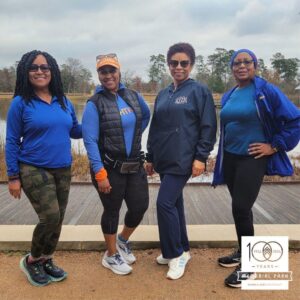Park Conversations: Remembering the “Mutiny and Riots” of August 23, 1917.
Audio Stories
Through six onsite audio experiences, situated throughout the Clay Family Eastern Glades, you will hear from descendants and community members connected to these events, reflecting on their impact over a century later. These will be available from August 23, through September 26.
Listen to the stories here:
Listen to Jaime González as he talks about the origins of Memorial Park’s prairie landscape and the rich diversity of people who have tended this land for millennia. This land is both biodiverse and culturally diverse. Click here to listen and learn more
Hear Professor Angela Holder’s story, whose great uncle Corporal Jesse Moore served as a soldier in the 24th Infantry Regiment at Camp Logan. Jesse Moore was amongst the first 13 members of the 24th who were executed for their alleged participation. Please note, this content may not be suitable for younger audiences. Click here to listen and learn more.
Hear Jason Holt’s story. Jason’s great uncle, Private 1st Class Thomas Coleman Hawkins served as a soldier in the 24th Infantry Regiment at Camp Logan. He was amongst the first 13 soldiers executed for their alleged participation in the events of August 23, 1917. Please note, this content may not be suitable for younger audiences. Click here to listen and learn more.
Listen to Professor Catherine Greene Burnett as she identifies the inconsistencies during the court proceedings that led to the soldiers’ convictions following the events of August 1917. Hear how law students at the Innocence Clinic have researched some of the root causes of wrongful conviction and how this has continued relevance today. This content may not be suitable for younger audiences. Click here and listen to learn more.
Listen to Dru Brenner- Beck as she reflects upon the soldiers’ legacy and the importance of honoring their memory through proper recognition of their service and the injustices in their trials. The petition for clemency seeks to right these wrongs by overturning each soldier’s convictions and upgrading their characterization of service to honorable. This content may not be suitable for younger audiences. Click here to listen and learn more.
Dr. Rudy Rasmus is a native Houstonian with deep roots in the community. Listen as he shares childhood memories of Memorial Park and reflects on how the area has changed in recent years. Click here to listen and learn more.
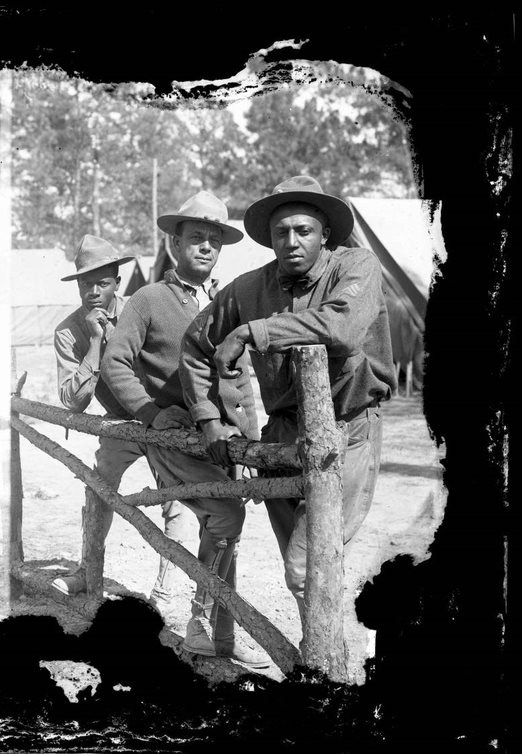
History
Camp Logan was a vital part of the fabric of Houston’s community, the camp trained 70,000 soldiers, and there are many stories of heroism and bravery associated with the soldiers that lived and worked here. However, there are also stories of tragedy.
In July 1917, soldiers of the 3d Battalion, 24th Infantry Regiment were ordered to Houston to guard the construction of Camp Logan. Just the year before, this unit had served in combat under Black Jack Pershing in the Punitive Expedition against Pancho Villa. The 24th Infantry Regiment, one of the four “Buffalo Soldier” Regiments in the U.S. Army, had served the nation bravely in the Philippines, Mexico, and the western frontier for decades. After arriving in Houston, the soldiers of 3rd Battalion endured virulent racist abuse under the city’s Jim Crow laws, until violence erupted on the night of August 23. Believing they were threatened by attack from an armed mob, soldiers marched into Houston’s Fourth Ward in violation of earlier orders to remain in camp. Nineteen people died.
These events occurred only six weeks after the St. Louis Race Massacre, one of the deadliest race massacres in the early 20th Century, and were the precursor for the racist violence of what would be called the Red Summer in 1919. In the aftermath of the violence in Houston, the U.S. Army charged 118 soldiers with “mutiny” and murder in three general courts-martial. The first trial of 63 defendants resulted in the conviction of 58 and execution of 13 soldiers. These 13 soldiers were executed on December 11, 1917, with no outside review within hours of their sentence being approved by their commander, sparking outrage across the nation. In the next two trials, an additional 52 soldiers were convicted and 6 more executed in 1918. The three courts-martial were marked by serious irregularities and a failure of due process. The executed soldiers were buried in graves marked only by a number near Saludo Creek on Fort Sam Houston in San Antonio, but 17 of the 19 executed soldiers were reburied in Fort Sam Houston National Cemetery in 1937. Because of the national outrage at the unreviewed executions of the original 13 soldiers, the Army implemented the first appellate review process for military courts-martial in the 1920 Articles of War.
Source: Petition for Clemency, South Texas College of Law Houston Special Library Collection.
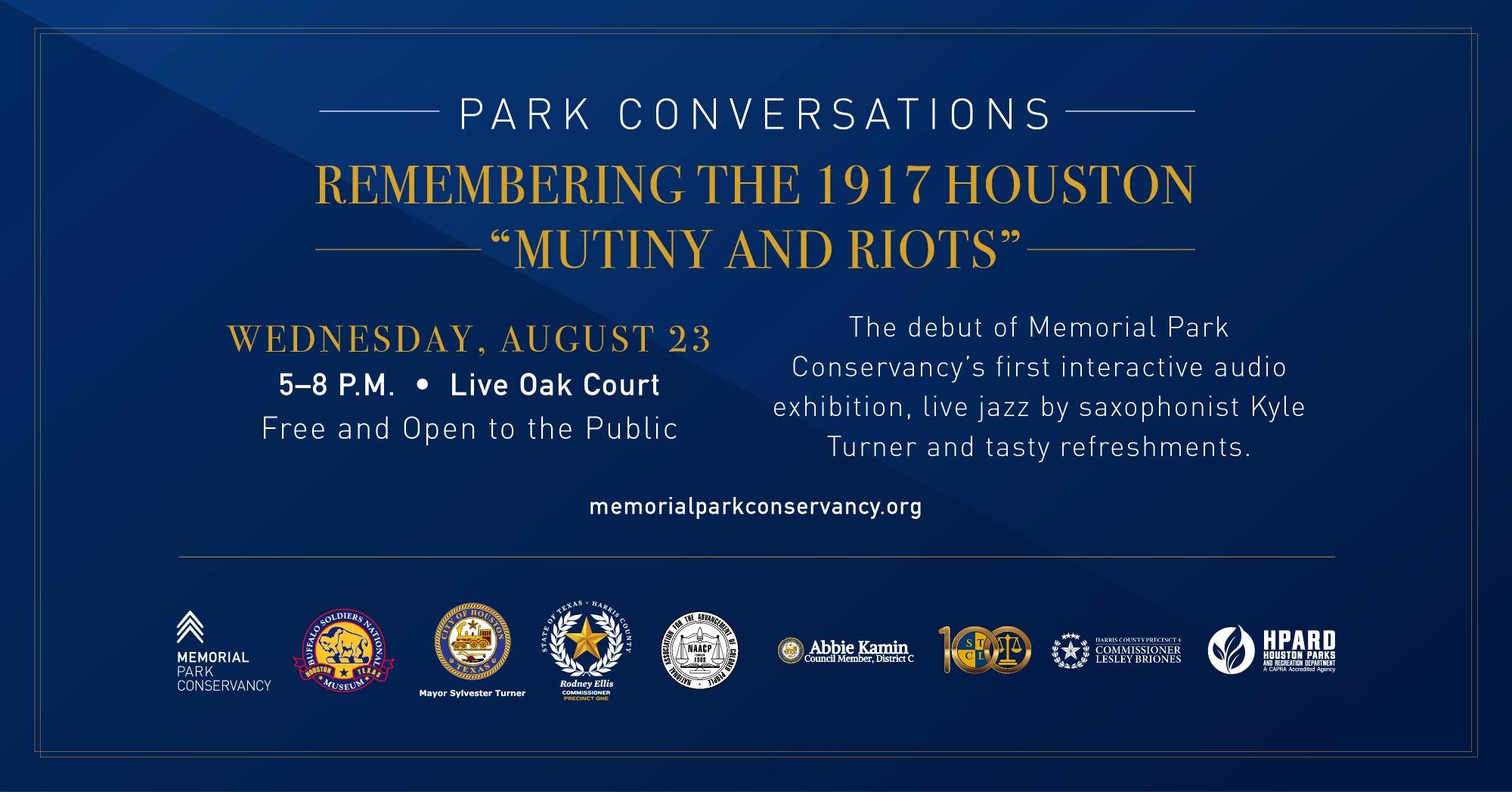
As stewards of historic Camp Logan—the former World War I training camp which is today’s Memorial Park—Memorial Park Conservancy invites the community to commemorate the anniversary of the 1917 Houston Mutiny and Riots. The Conservancy will debut its inaugural interactive audio exhibition on August 23, 2023—the 106th anniversary of this tragic day in Houston’s history—as part of its Park Conversation Series, in partnership with Buffalo Soldiers National Museum.
A free educational exhibition, Park Conversations: Remembering the 1917 Houston “Mutiny and Riots” will feature six onsite audio experiences situated throughout Memorial Park’s Clay Family Eastern Glades. Participants* can connect their personal headphones to listen to words of descendants and community members who have a personal connection to these events and have used their experience to examine and address them over 100 years later. The self-guided interactive audio exhibition will be available for the public to experience from August 23 through September 26, 2023.
To kick off the Park Conversations interactive audio exhibition, Memorial Park Conservancy is hosting an opening reception on Wednesday, August 23 from 5-8 PM in Live Oak Court. The free public event will feature refreshments, live entertainment by world-renowned saxophonist Kyle Turner, and the first opportunity to experience the month-long interactive audio exhibition, listening to the words of decedents and community members whose reflections humanize this tragedy.
Additional program partners include Houston Mayor Sylvester Turner, Harris County Precinct One Commissioner Rodney Ellis, NAACP, Houston City Council Member Abbie Kamin (District C), South Texas College of Law Houston, County Precinct Four Commissioner Lesley Briones, and Houston Parks and Recreation Department.
*Parental discretion is advised due to the sensitive nature of the audio content in the audio exhibit.
Opening Reception
Wednesday, August 23, 5-8 PM
Self-Guided Audio Exhibition
Wednesday, August 23 through Tuesday, September 26, 7 AM-8 PM
Free and open to the public – no registration required
WHERE: Clay Family Eastern Glades in Memorial Park
552 East Memorial Loop Drive
Houston, TX 77007
PARKING: Clay Family Eastern Glades has parking on-site. Parking is $1 for 3 hours and is available on a first come, first served basis.
If you have any questions about this event, please contact Liz Jordan at ljordan@memorialparkconservancy.org

